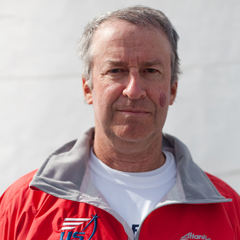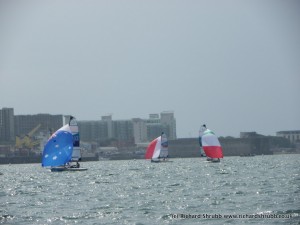FACT: You do not have to be able bodied to beat the fleet in sailing.
The sport is one of the most egalitarian of all – as much a game of the mind as the body. Women can out sail men, and the disabled can beat able bodied sailors in most dinghy and yacht races. As such, for the disabled person, learning to sail can often be the most liberating sporting activities of all.
This piece will look at some characters I have met over the years, and at disabled sailing as a whole to show you that unlike most other sports, everyone is on a level playing field at the start line. If you’re disabled and reading this, why not learn to sail?
Tom Brown teaches yacht and dinghy sailing at Maine Maritime Academy in the US. At one point he was fingered as among the very best competitive sailors in the US, and has taught a number of young sailors who went on to do very well in competitive sailing.
He had bone cancer as a youngster a nd his leg amputated at the knee.
nd his leg amputated at the knee.
Ahead of the Sydney Olympics, he missed selection to Team USA by a whisker. The same day there was the Paralympic selection events, so he got into another boat and qualified as a Paralympian.
In the 2000 Sydney games he won a Bronze medal in the 2.4mR event, and got a Silver at Athens the following games.
In many sailing events, you don’t really need your legs except to shift from side to side according to which tack you are on.
There is a medical study being carried out on the Volvo Ocean Race at present to look at how 30 days at sea impacts your physiology. Previous studies have shown that where your arms, chest and back muscles get a real workout, your leg muscles actually atrophy from lack of use. This is why between legs of the Volvo Ocean, sailors do a lot of running and leg exercise to keep up to strength.
 Paul Callahan
Paul CallahanPaul Callahan was one of the biggest characters I ran into in Team USA in 2012. He broke his neck slipping in a shower while an undergraduate at Harvard.
Undaunted, and via a career as a property developer, an MBA at Harvard, and a job at Goldman Sachs, he took an interest in a failing sailing school for people with spinal injuries in Newport, Rhode Island.
Using his business acumen he took over the school and opened it to people with any disability. Sail to Prevail is now one of the top disabled sailing schools in the US.
Sail to Prevail has as its flagship, a former Americas Cup 15 metre yacht, converted to enable people with any ability to sail.
Callahan can’t use his hands so had a friend develop a contraption to enable him to steer a boat using his arms. Unable to use his legs, he has another system to help him transfer his weight from side to side on a boat. Though the man has to be lifted out of his electric wheelchair and lowered into his boat, he can play a significant role in racing it as skipper.

The SKUD-18 is one of the great levelling classes of sailing.
It is a high performance boat with an asymmetric spinnaker yet has been chosen by the International Federation of Disabled Sailing as one of the three classes of Paralympic boats.
The new configuration even allows for someone to use a trapeze, though this isn’t allowed in specific disabled sailing events.
Some of the best sailors in the world of any ability race this boat as it doesn’t hang about!
After the UK had one of the most successful Paralympics ever held, with pre games events for able and disabled sailing held in parallel in the run up, Rio seems to be doing its best to forget the disabled.
Though pre Olympics test events have been running off the coast of the city for the last year already, enabling competitors to see the dead dogs and untreated turds in the water first hand, the Rio organisers have yet to schedule a disabled sailing event. This is unacceptable for people who are often as good if not better sailors than their able bodied competitors, and reeks of discrimination.
Unfortunately, attitudes have still to change at the very top level before disabled and able bodied sailing has parity of esteem in the popular imagination.
Sailing is as much of a mental sport as it is a physical sport, and you should not be surprised if you see disabled sailors come top of the leader board in a regatta today, let alone some day in the future.
If you’re disabled and reading this? Get out there, as able bodied people won’t pat you on the head for trouncing them at the next racing series – they’ll look you in the eye as they would the next man.
Read this article to find out what sailing courses are available for the disabled.